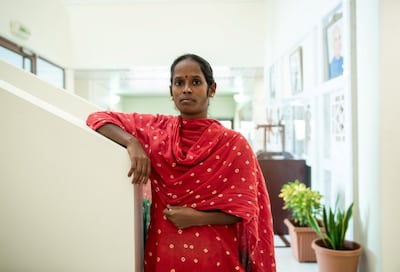An Indian mother-of-three who worked as a housemaid in the UAE said she was beaten by an agent and worked inhumane hours without being paid.
Veerammal Radhakrishnan, 28, fled from a house in Ajman with just the clothes she was wearing to the Indian embassy in Abu Dhabi this week.
"I couldn't sleep because there was so much work," Ms Radhakrishnan told The National, weeping as she wiped her eyes with a dupatta, a long scarf, wrapped across her hunched shoulders.
“I came to earn money for my children because my husband cannot keep a job. Now I want to go home."
A farm labourer from southern India’s Tamil Nadu state, Ms Radhakrishnan’s story is similar to hundreds of runaway maids. Many are lured to the UAE by unscrupulous recruiters with promises of high wages.
An all-women’s team at the Indian embassy is tasked with looking after these victims and sound an alert at home.
Using information they obtain from domestic workers seeking refuge, the team warns Indian police about networks operating in towns and villages. They aim to protect others from being targeted by criminal recruitment gangs.
They also work with law enforcement in the UAE by identifying agents living here based on names and locations from the women.
“The aim is to safely repatriate these women but we also want to help nab the culprits,” said Smita Pant, deputy chief of mission at the Indian Embassy in Abu Dhabi.
“When these women come to us they have gone without food and sometimes water, they have no clothes of their own. They feel violated in their situation. We want to help law enforcement agencies get hold of these illegal agents.”
Indians make up the largest expatriate group in the UAE with an estimated 3.3 million people.
The Indian embassy and consulate in the UAE has repatriated 434 women in distress over the past two years. Almost all were runaway domestic helpers.
Of these, one woman who returned to India this year was forced into human trafficking.
Hyderabad has emerged as the Indian city from which the largest number of vulnerable women are sent overseas, officials said.
At the embassy, a distraught Ms Radhakrishnan required frequent assurances that she was safe and would not be handed back to the agent.
She came to the UAE seven months ago with dreams of a bright future for her poverty-stricken family. She was promised a good salary as a cook in Dubai.
Coached by the female recruiter, who travelled with her, Ms Radhakrishnan arrived on a tourist visa and told immigration authorities at New Delhi and Dubai airports she would be staying with a relative.
The agent then sent her to numerous homes in the UAE to cook, clean and iron.
She has only been paid Dh900, her wages and passport were withheld by the female agent, who said this was towards payment of air tickets and visa expenses. Under UAE law it is illegal to withhold an employee's passport or ask them to pay any part of their visa costs.
Unaware of the extent to which she was being exploited, Ms Radhakrishnan was made to work arduous hours. She said 15 hours was a "good" day.
“The timings were good in the first house in Abu Dhabi because I worked from 7am to 10pm," she said.
"But in a house in Sharjah I had to work from 3am to 12am the next day.”
She lived in a few homes as a full-time housemaid and later was kept in a house in Ajman that was used as a base to farm her out for temporary work.
She was also repeatedly beaten by the agent.
In earlier cases reported, women have told about large numbers locked up in small rooms.
In Ms Radhakrishnan’s case, her movements were constantly monitored and she was rarely allowed out alone.
On Tuesday, she gave her handlers the slip when she asked to buy Indian clothes in an Ajman supermarket.
A local taxi driver agreed to take her to Abu Dhabi for Dh100 she had managed to save.
“I had one chance. They did not suspect I would run away because I was not carrying anything, no bag, no clothes,” she said.
Embassy staff are now working to get Ms Radhakrishnan safely back home.
To exert pressure on illegal agents at home, the embassy team works with police in the women’s hometown to get recruiters to pay the return airfare.
The team also uses social media and tags the airports from which the women depart to alert the general public of immigration scams.
“We want the agents to feel the pinch so we started speaking to the superintendent of police to take action against the agents,” deputy mission chief Ms Pant said.
“The number of women who come to us is just the tip of the iceberg because it takes effort for them to get here. We are also collaborating with local authorities and have received good co-operation from the UAE.”
Under a law brought in to protect domestic workers issued in 2017, shifts should not exceed 12 hours a day, with 30 days paid annual leave and with one day off per week.
Illegal employment agents circumvent the rules by bringing women into the country on visit visas. The women often do not speak English, Arabic or Hindi, are too scared to complain and unaware of their rights or where to turn to.
For Ms Radhakrishnan, the final straw was learning her 14-year-old daughter in India had broken her leg and needed medical attention.
“I came here to work hard for my children but what was the use?” she said.
“Now I need to go back to take care of my family.”


